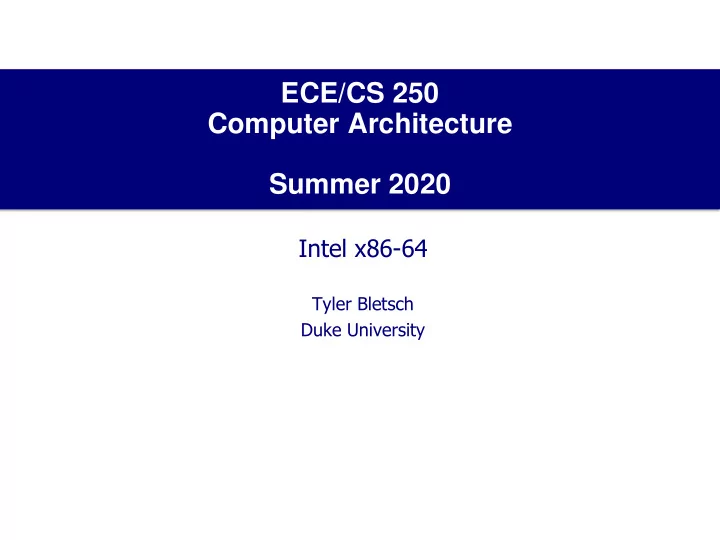

ECE/CS 250 Computer Architecture Summer 2020 Intel x86-64 Tyler Bletsch Duke University
Basic differences MIPS Intel x86 Word size Originally: 32-bit (MIPS I in 1985) Originally: 16-bit (8086 in 1978) Now: 64-bit (MIPS64 in 1999) Later: 32-bit (80386 in 1985) Now: 64- bit (Pentium 4’s in 2005) Design RISC CISC ALU ops Register = Register ⦻ Register Register ⦻ = <Reg|Memory> (3 operand) (2 operand) Registers 32 8 (32-bit) or 16 (64-bit) Instruction size 32-bit fixed Variable: up to 15 *bytes*! Branching Condition in register (e.g. “ slt ”) Condition codes set implicitly Endian Either (typically big) Little Variants and Just 32- vs. 64-bit, plus some A bajillion (x87, IA-32, MMX, 3DNow!, extensions graphics extensions in the 90s SSE, SSE2, PAE, x86-64, SSE3, SSE4, SSE5, AVX, AES, FMA) Market share Small but persistent (embedded) 80% server, similar for consumer (defection to ARM for mobile is recent) 2
64-bit x86 primer • Registers: • General: rax rbx rcx rdx rdi rsi r8 r9 .. r15 • Stack: rsp rbp Intel syntax AT&T syntax • Instruction pointer: rip mov rax, 5 mov 5, %rax • Complex instruction set mov [rbx], 6 mov 6, [%rbx] add rax, rdi add %rdi, %rax • Instructions are variable-sized & unaligned push rax push %rax • Hardware-supported call stack pop rsi pop %rsi call 0x12345678 call 0x12345678 • call / ret ret ret • Parameters in registers { rdi , rsi , rdx , jmp 0x87654321 jmp 0x87654321 jmp rax jmp %rax rcx , r8 , r9 } , return value in rax call rax call %rax • Little-endian • These slides use Intel-style assembly language (destination first) • GNU tools like gcc and objdump use AT&T syntax (destination last) 3
Intel x86 instruction format From Igor Kholodov’s CIS-77 course materials, 4 http://www.c-jump.com/CIS77/CPU/x86/lecture.html
Map of x86 instruction opcodes by first byte Figure from Fraunhofer FKIE 5
Intel x86 general-purpose registers (64-bit, simplified) Old-timey names from the 16-bit era They didn’t bother giving dumb names when they added more registers during the move to 64-bit. 6
Intel x86 registers (64-bit, complexified) • Includes general purpose registers, plus a bunch of special purpose ones (floating point, MMX, etc.) 7
Memory accesses • Can be anywhere • No separate “load word” instruction – almost any op can load/store! • Location can be various expressions (not just “0($1)”): • [ disp + <REG>* n ] ex: [ 0x123 + 2*rax ] • [ <REG> + <REG>* n ] ex: [ rbx + 4*rax ] • [ disp + <REG> + <REG>* n ] ex: [ 0x123 + rbx + 8*rax ] • You get “0($1)” by doing [0 + rax*1], which you can write as [rax] • All this handled in the MOD-R/M and SIB fields of instruction • Imagine making the control unit for these instructions 8
MIPS/x86 Rosetta Stone Operation MIPS code Effect on MIPS x86 code Effect on x86 Add registers $1 = $2 + $3 $1 += $2 add $1, $2, $3 add rax, rbx Add immediate $1 = $2 + 50 $1 += 50 addi $1, $2, 50 add rax, 50 Load constant $1 = 50 rax = 50 li $1, 50 mov rax, 50 Move among regs $1 = $2 rax = rbx move $1, $2 mov rax, rbx Load word lw $1, 4($2) $1 = *(4+$2) mov rax, [4+rbx] rax = *(4+rbx) Store word *(4+$2) = $1 *(4+rbx) = rax sw $1, 4($2) mov [4+rbx], rax Shift left $1 = $2 << 3 rax <<= 3 sll $1, $2, 3 sal rax, 3 Bitwise AND $1 = $2 & $3 rax &= rbx and $1, $2, $3 and rax, rbx No-op nop nop - - movn $1, $2, $3 if ($3) { $1=$2 } test rcx (Set condition flags based on ecx) Conditional move if (last_alu_op_is_nonzero) { rax=rbx } cmovnz rax, rbx Compare $1 = $2<$3 ? 1 : 0 (Set condition flags based on rax-rbx) slt $1, $2, $3 cmp rax, rbx addi $sp, $sp, -4 SP-=4 push rcx *SP = rcx ; SP-=4 Stack push *SP = $5 sw $5, 0($sp) Jump PC = label PC = label j label jmp label jal label $ra = PC+4 call label *SP = PC+len PC = label SP -= 4 Function call PC = label PC = $ra PC = *SP jr $ra ret Function return SP+=4 if ($2<$3) PC=label if (rax<rbx) PC=label Branch if less than slt $1, $2, $3 cmp rax, rbx bnez $1, label jl label 9 Request syscall Requests kernel Requests kernel syscall syscall
Stuff that doesn’t translate… Task x86 instruction jo label Branch if last ALU op overflowed jpe label Branch if last ALU op was even xchg rax, rbx Swap two registers fsqrt Square root prefetchnta 64[esi] Prefetch into cache Special prefix to do an instruction until the end of string rep (Kind of like “while(*p)”) fldpi st(0) Load constant pi pushad Push all the registers to the stack at once loop label Decrement rcx and branch if not zero yet Add multiple numbers at once (MMX) addps xmm0, xmm1 (Single Instruction, Multiple Data (SIMD)) Scan a string for a null (among other things) pcmpistri (Vastly accelerates strlen()) aesenc Encrypt data using the AES algorithm 10
Recommend
More recommend